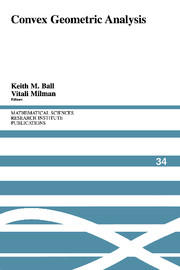Book contents
- Frontmatter
- Contents
- Introduction: The Convex Geometry and Geometric Analysis Program MSRI, Spring 1996
- Msri Program Seminars
- Integrals of Smooth and Analytic Functions over Minkowski's Sums of Convex Sets
- Localization Technique on the Sphere and the Gromov-Milman Theorem on the Concentration Phenomenon on Uniformly Convex Sphere
- Geometric Inequalities in Option Pricing
- Random Points in Isotropic Convex Sets
- Threshold Intervals under Group Symmetries
- On a Generalization of the Busemann-Petty Problem
- Isotropic Constants of Schatten Class Spaces
- On the Stability of the Volume Radius
- Polytope Approximations of the Unit Ball of ℓnp
- A Remark about the Scalar-Plus-Compact Problem
- Another Low-Technology Estimate in Convex Geometry
- On the Equivalence Between Geometric and Arithmetic Means for Log-Concave Measures
- On the Constant in the Reverse Brunn-Minkowski Inequality for p-Convex Balls
- The Extension of the Finite-Dimensional Version of Krivine's Theorem to Quasi-Normed Spaces
- A Note on Gowers' Dichotomy Theorem
- An "Isomorphic" Version of Dvoretzky's Theorem, II
- Asymptotic Versions of Operators and Operator Ideals
- Metric Entropy of the Grassmann Manifold
- Curvature of Nonlocal Markov Generators
- An Extremal Property of the Regular Simplex
- Floating Body, Illumination Body, and Polytopal Approximation
- A Note on the M*-Limiting Convolution Body
A Remark about the Scalar-Plus-Compact Problem
Published online by Cambridge University Press: 27 June 2025
- Frontmatter
- Contents
- Introduction: The Convex Geometry and Geometric Analysis Program MSRI, Spring 1996
- Msri Program Seminars
- Integrals of Smooth and Analytic Functions over Minkowski's Sums of Convex Sets
- Localization Technique on the Sphere and the Gromov-Milman Theorem on the Concentration Phenomenon on Uniformly Convex Sphere
- Geometric Inequalities in Option Pricing
- Random Points in Isotropic Convex Sets
- Threshold Intervals under Group Symmetries
- On a Generalization of the Busemann-Petty Problem
- Isotropic Constants of Schatten Class Spaces
- On the Stability of the Volume Radius
- Polytope Approximations of the Unit Ball of ℓnp
- A Remark about the Scalar-Plus-Compact Problem
- Another Low-Technology Estimate in Convex Geometry
- On the Equivalence Between Geometric and Arithmetic Means for Log-Concave Measures
- On the Constant in the Reverse Brunn-Minkowski Inequality for p-Convex Balls
- The Extension of the Finite-Dimensional Version of Krivine's Theorem to Quasi-Normed Spaces
- A Note on Gowers' Dichotomy Theorem
- An "Isomorphic" Version of Dvoretzky's Theorem, II
- Asymptotic Versions of Operators and Operator Ideals
- Metric Entropy of the Grassmann Manifold
- Curvature of Nonlocal Markov Generators
- An Extremal Property of the Regular Simplex
- Floating Body, Illumination Body, and Polytopal Approximation
- A Note on the M*-Limiting Convolution Body
Summary
1. Introduction
It is an open problem whether there exists an infinite-dimensional Banach space X such that every bounded linear operator from X to itself is of the form ƛI + K, where).ƛ. is a scalar, I is the identity on X and K is a compact operator. The strongest property of a similar nature that has been obtained is that a space may be hereditarily indecomposable (see [GM] for this definition and several others throughout the paper), which implies [GM] that every operator on it is of the form
ƛI + S, where S is strictly singular, and even [Fl] that every operator from a subspace into the space is a strictly singular perturbation of a multiple of the inclusion map. (These results assume complex scalars but several examples are known where the conclusion holds with real scalars.) In this note, we show that the first hereditarily indecomposable space to be discovered [GMJ, which we shall call X, has a subspace Y such that there is a non-compact strictly singular operator from Y into X. Therefore this operator is not a compact perturbation of a multiple of the inclusion map. Since all we are doing is showing that one particular space does not give an example of a stronger property than that required by the problem, the existence of this note needs some justification, which we shall now provide.
First, if one is trying to solve the problem with an example, then a natural line of attack is to try to construct a hereditarily indecomposable space such that every strictly singular operator is compact.
Information
- Type
- Chapter
- Information
- Convex Geometric Analysis , pp. 111 - 116Publisher: Cambridge University PressPrint publication year: 1999
